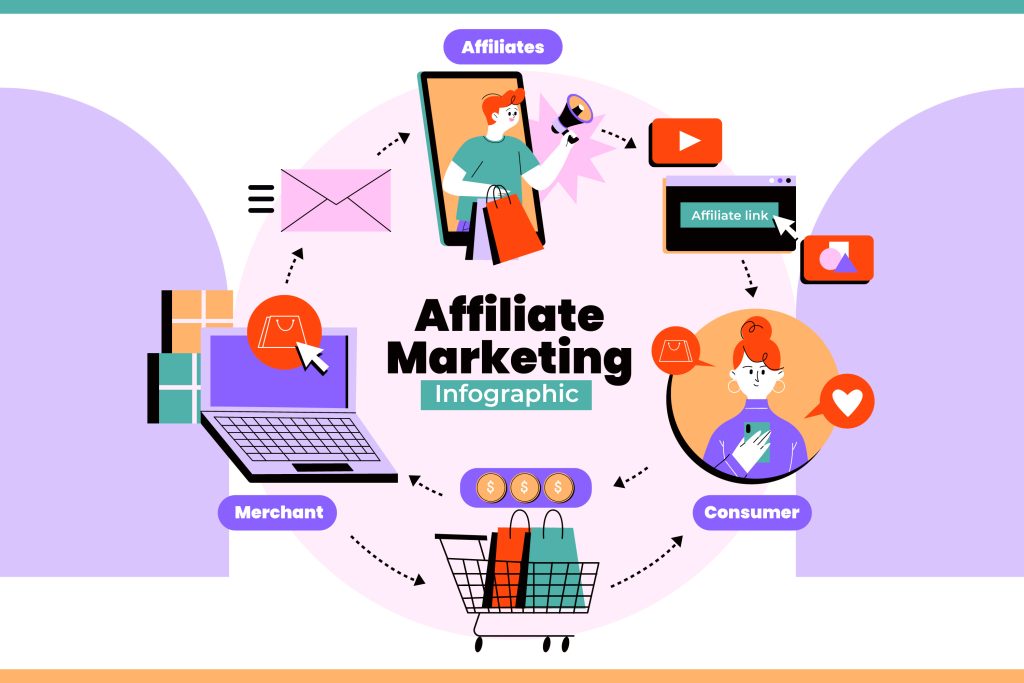For many, the holy grail of online marketing is earning a substantial passive income. Once you have done the groundwork, you can sit back and wait for the money to roll in. Of course, for most people it’s not that easy, and like King Arthur’s knights, many people never find their nirvana.
But some people do manage to make a decent amount of passive income. The most common way to do this is through affiliate marketing. You promote other people’s products, make sales, and get to keep a portion of the profits. Other people make the products; you promote them and receive a commission for your efforts.
Of course, there are some pitfalls. It is hard to sell on the Internet if no one knows you exist. But if you already have a sizable online following – perhaps you already qualify as an influencer, for example – you have the potential to earn that lucrative and coveted passive income.
What is Affiliate Marketing?

In many ways, affiliate marketing is a modern version of traditional commission selling. Brands (affiliate merchants) pay a percentage for each sale generated by an influencer (affiliate marketer).
Affiliate marketers promote products using a unique link to the brand’s website. When shoppers purchase the product through their link, the affiliate is rewarded with a commission. Websites use cookies to keep track of shoppers’ visits, so even if they decide to purchase at a later time, the sale is still credited to the affiliate.
Affiliate marketing is a form of revenue sharing. People who have products but no captive audience can expand their market by partnering with people who have an audience but no product.
Influencers make good affiliate marketers because they come with a ready-made online audience.
Who are the Parties in Affiliate Marketing?

Affiliate marketing involves either three or four parties, depending on the situation. The consumer pays the money. Each of the other parties takes a cut of that money. The relevant groups in these transactions are
The Product Creator (or Merchant) – these are the companies that provide products for sale. This party has several names: creators, merchants, sellers, brands, retailers, or vendors. In short, they have products they want to sell.
The affiliate network – this is the optional party on this list. Although some product creators interact directly with affiliates, many others use an intermediary instead. In fact, in some cases, such as Amazon, affiliate networks also act as retailers. Affiliate networks work with product creators to create a catalog of products that they make available for affiliates to sell.
The affiliate marketer – these people choose one or more products and encourage their online readers, viewers, or contacts to buy them. Affiliates can promote and create sales links on their websites (or even create dedicated sites to review the products) or social channels.
The consumer – ultimately, someone has to buy the products. The consumer notices the affiliate marketer’s recommendations, follows their customized links, and purchases the products.
How Does Affiliate Marketing Work?
Product creators make, import, or purchase products to sell. They decide to share a portion of the sales revenue with the people who sell their products.
Depending on the size of each Creator, they choose to work either directly with Affiliate Marketers or through an Affiliate Network.
The affiliate networks act as an intermediary between the creators and the affiliate marketers.
When someone decides to become an affiliate marketer, they usually sign up with one or more creators or affiliate networks. At this point, affiliate marketers often decide what products they want to sell.
The publisher or affiliate network will give each affiliate marketer a unique code. This means that the affiliate marketer can insert their code in the URL when linking to the products they want to promote, and the publisher/affiliate network will know who sent each customer who makes a purchase.
How Do You Become an Affiliate Marketer?
If you decide to become an affiliate marketer, you need to follow a series of steps.
- Decide what niche you want to specialize in. If you are already an influencer, this should be easy – you would be selling products of interest to your existing followers in your niche.
- Review affiliate products in your niche. Now that you know the types of products you want to sell, you need to decide on the exact products you want. Again, many influencers and top bloggers limit themselves to products they use themselves. Others don’t necessarily do this, but they do make sure that the products are of acceptable quality and won’t damage their reputation by being associated with them.
- Apply to become an Affiliate for the product you want to promote. You will either apply to the appropriate affiliate network or directly to the affiliate merchant, depending on how they set things up.
- Collect emails and build your audience. The exact methods you use to do this will vary from affiliate to affiliate. The goal is to build as many leads as possible. Some people create a new website for each affiliate product where they write reviews and relevant blog posts. Others use their existing websites and social pages to promote the products to their current followers. This is where influencers have an advantage over others.
- Consider scaling your affiliate marketing with pay-per-click (PPC) online advertising on Google and Facebook (or other social networks, depending on your audience).
- To gain access to a broader audience, some affiliate marketers outsource some of their marketing to other influencers, hoping that the additional reach of the influencers will generate enough sales to more than pay for the cost of the influencer.
Benefits of Becoming an Affiliate Marketer
Affiliate marketing is a lucrative business that can generate huge passive income if done correctly. The promise of this “earning while you sleep” is what attracts many people to try their hand at affiliate marketing.
Here are some of the other reasons why affiliate marketing is such a profitable business venture.
- Affiliate marketing is low risk. You only spend time and resources marketing the product. You don’t have to develop the product, manage inventory, or deal with customer service.
- Commissions are generous. Most affiliate programs offer huge commission rates for as many purchases as your affiliate link can produce. They don’t put a cap on how much you can earn, and some even reward consistent high performance.
- You don’t need an upfront investment. Joining an affiliate marketing program is usually free. While you should personally use a product, it’s not required.
- The business is scalable without the need for additional staff. You can always introduce new products to your followers and increase your affiliate revenue without hiring extra help.
- You can make money simply by promoting the products you already use and love. Most of the products you use already have an affiliate program you can join.
Tips to Begin with Affiliate Marketing

Here are more tips to help you become a successful affiliate marketer:
- Create an affiliate marketing strategy to promote your offer. Before you can earn passively from affiliate marketing, you need to invest time and energy in building your business. Set goals and metrics so you’ll know if your strategy is working or if you need to tweak it.
- Use the product and write good reviews based on your personal experience. People like authenticity and trust. They want to know they can trust your opinion, and giving honest reviews is one way to do that.
- Promote affiliates you’d use and limit the number of affiliates you promote. Just because a brand has an affiliate program doesn’t mean you have to join it. By promoting a limited number of brands, you show your audience that you only endorse the products you believe in.
- Talk to product experts. In addition to your personal opinions, the views and opinions of product experts add depth to your recommendations.
- Share product tutorials. By showing your audience how to use the products you recommend, they’re more likely to see how they can benefit from them. “How-to searches are also a popular way to drive more people to your site or content.
- Add bonuses for people who use your affiliate link. It’s a common practice to add personal bonuses, such as one-on-one coaching sessions or access to a private group, as bonuses for people who sign up through your link. This gives them an extra incentive to choose you over other influencers who are also promoting the same product.
- Always tell your followers when you’re using affiliate links. Not only is it required by law, but it also builds trust between you and your audience.


